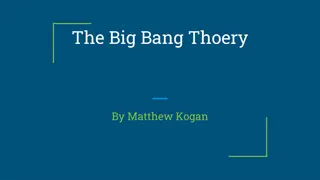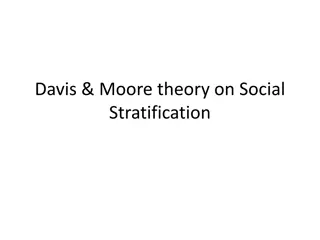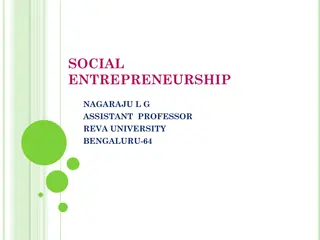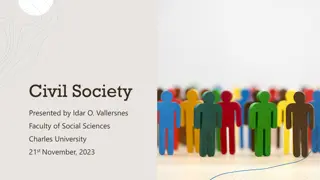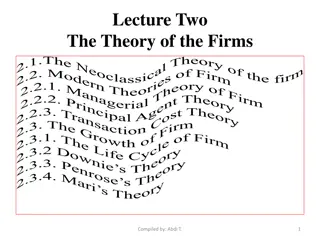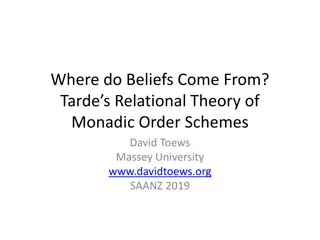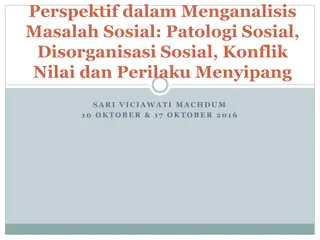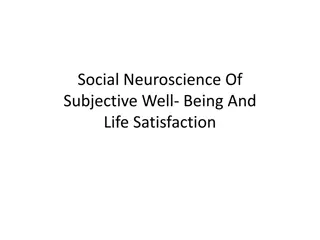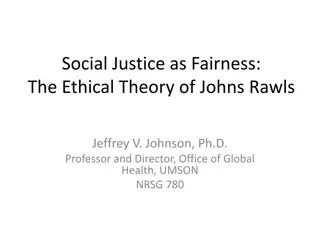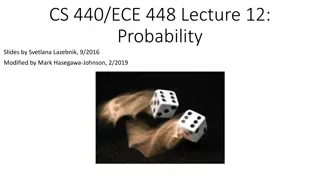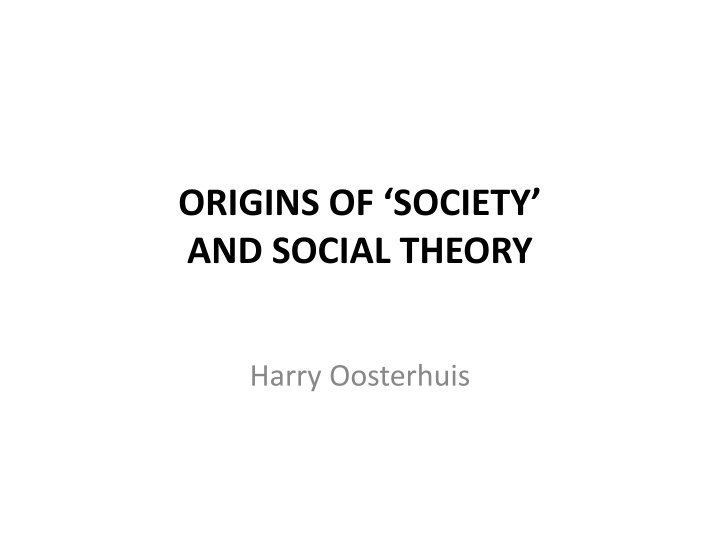
Origins of Society and Social Theory
Explore the historical development of society, the impact of modernization, and the emergence of social theory from the 18th to 19th centuries. Discover how traditional social structures crumbled, leading to individualization and the conceptualization of society as a complex network of interactions. Delve into the reflections on social modernization, changing conditions of social life, and the role of individuals in shaping and being shaped by society.
Download Presentation

Please find below an Image/Link to download the presentation.
The content on the website is provided AS IS for your information and personal use only. It may not be sold, licensed, or shared on other websites without obtaining consent from the author. If you encounter any issues during the download, it is possible that the publisher has removed the file from their server.
You are allowed to download the files provided on this website for personal or commercial use, subject to the condition that they are used lawfully. All files are the property of their respective owners.
The content on the website is provided AS IS for your information and personal use only. It may not be sold, licensed, or shared on other websites without obtaining consent from the author.
E N D
Presentation Transcript
ORIGINS OF SOCIETY AND SOCIAL THEORY Harry Oosterhuis
Two dimensions of modernization: historical reality and reflection Traditional social order modern society Industrial Revolution Rise of capitalism Legitimated by religious and metaphysical principles, inherited customs, and imposed by indoctrination and force Social theory/philosophy Sociology (Ideologies) Tocqueville Marx Saint-Simon Comte Spencer Weber
What this lecture is about Interaction between historical process of social modernization and sociological reflection on: SOCIETY . Self-evident for us: we are aware of living in it, although a precise definition is not easy. Historically far from obvious: society is a modern notion which came into being and was articulated in 18th-c. social theory and in 19th-c. sociology. Society only conceivable as consequence of the collapse of the traditional social order and increasing individualization.
Crumbling of traditional social structures + individualization Existing social order no longer taken for granted: New questions: How/why does it change? How is social order (what kind of?) possible? What is the relation between individuals and the social system of which they are part? Reflection of the social: social theory/philosophy
Social theory and sociology as modern ways of making sense of how people live together and interact Thought on social life since the late 17thcentury: social theory/philosophy = reflection on social modernization: changing conditions of how people lived together changing social experiences new ways of making sense of social life idea of society articulated and modern self-understanding of human beings as individuals and as social beings at the same time. Term sociology as a scientific discipline coined in the 1830s (Comte) shaping of sociology as a scientific discipline (Marx, Durkheim, Weber).
Modern concept of society and self-understanding of human beings as social beings Society: a complex and dynamic network of continuing interaction and interdependence of individuals in a large-scale (national, European/Western) setting. Individuals feedback mechanism: Individuals shape and reshape society through their interactions; Individuals are shaped by what they have (historically) formed (society). Social structure Society as an impersonal structural reality in and for itself: social structure, more than just the sum of the individuals participating in it: self-sustaining on the basis of inherent regularity, system and orderliness; individual positions, actions and roles (including free choice and initiative) constrained by social structures.
Traditional order: no individualism and therefore no reflection on the social People completely embedded in tightly knit communities and absorbed in collective and hierarchical order, from which it was difficult to detach oneself as an individual. As long as a distanced, individualized position apart from the given social order is difficult, questioning of that order and reflection on the social is not likely. Like a fish in the water: not aware of the specific nature of its living-environment alternative dry world unimaginable and deadly.
Traditional social order: top-down legal and moral-religious order Not social in the sense of society as a dynamic social reality in and for itself in which individuals were involved in different and changing ways, but: imposed from above by the state and the Church through: jurisdiction, power and force; patriarchal dominance and moral indoctrination. Presented and justified as inevitable and permanent, part of the given nature of things in an ordered universe, ordained by God and sacrosanct tradition No further reflection and explanation imaginable and needed. Social order not so much explained as directly expressed and made visible in the very concrete ways (the theatre) of people s appearance and behaviour outward signs of status and prestige, strict conventions and codes of conduct, dress, costumes, whigs, symbols, rituals and ceremonies, physical distance, either or not performing manual labour or particular tasks.
18thcentury: traditional order undermined by 3 new forms of social interaction and reflection Background: more general processes of modernization (individualization, upscaling, secularization, capitalism, industrialisation, democratisation). 1. Emergence of (elitist) high society and sociability - theorized in moral philosophy: civilized manners. 2. Creation of civil society through emancipating and democratizing impulse among rising middle class - reflected in enlightened social thought and in liberal political theory. 3. Advance of commonwealth , commercial market, signalling growing importance of economic activities surpassing the local agrarian and subsistence mode of existence - theorized in liberal political economy. Rise of modern society
High society and sociability After civil and religious warfare (16th-17thcentury) pacification of militarist aristocracy by centralizing state, which increasingly monopolized the use of force and violence. Aristocratic circles breaking with local and regional isolation, gathering at royal courts and in capitals, and establishing themselves as supra-local cultural elite on the basis refined ( civilized ) attitudes and manners. Elitist sociability in high society (monde, mondain) reflected in guidebooks for leading a successful and elegant life: good manners, keeping up appearances, pursuing ends and ambitions through role-playing, pretending, being nice and witty (calculated politeness), pleasing others and therefore being liked and valued by others ( in democratized form still part of our social life).
Following the aristocratic example bourgeoisie shaping civil society rising urban New forms of voluntary social organization on the basis of economic, social, cultural and intellectual interests and activities: middle-class associations ( societies ), clubs, salons, coffee- houses civil society: ensemble of organized, self-conscious, active and critical citizens (businessmen, professionals, intellectuals, artists) showing social awareness and associating apart from the state and the Church; arena for open and rational debates about public issues, circulation of knowledge and opinions, peaceful negotiation. Traditional order: irrational customs, religious dogma s, power of the sword and indoctrination.
Civil society: emancipatory and democratizing force, and social alternative for the traditional order Civil society as a social sphere in and for itself, with its own needs and interests, shaped by those participating and cooperating in it out of voluntary commitment 2 (political) claims: that middle class civil society is the centre of social life of the people ; that it is the arena for the definition and shaping of the public good it should have priority over state and Church. The social order should not be imposed from above by state and church Rulers should serve needs and wellbeing of citizens and interests of society on the basis of social utility Liberal demand: government legitimized through consent of civil society.
Civil society reflected in Enlightened social theory Broadening the meaning of sociability from refined interaction among elites to relations and interactions within a larger and more inclusive social and cultural constellation (middle class) man defined as social being, shaping himself and being shaped in interactions with others: Sociability defined as a vital element of human nature and of secularized morality: moral conduct, wellbeing and happiness realized in social interaction and mutual dependence (unlike traditional top-down enforcement). Optimism: individual and general interests can be harmonized inherent moral quality of social interactions guarantees alignment of individual interest and the common good (see Adam Ferguson s fellow-feeling and Adam Smith s sympathy and invisible hand ).
Importance of civil society reflected in political theory Protective liberalism and social contract theories (Hobbes, Locke, Rousseau, Montesquieu, Madison): - Civil society as voluntary contractual arrangement between free, autonomous and reasonable individuals who were articulating their needs and creating themselves the social conditions to fulfill these needs. - Restricting state power in order to make room for a distinct social space enabling self-development and self-improvement of rights-bearing citizens crucial non-political social space for middle class activities: economic life, the market.
Free market economy: society as commonwealth Commercial, financial and industrial activities by the middle class capitalism: products, services and labor exchangeable for money; buying and selling on the basis of demand and supply; self-interested, calculating and bargaining homo economicus. Middle class interests calling for liberation of economic activities and the market from traditional and irrational legal, moral, social and cultural restrictions. Benefits of the market: society as commonwealth : - Growing importance of productivity for creation of wealth and improvement of the quality of life. - Economic interaction with its own rational and utilitarian values, rules of efficiency and ways of behavior.
Need for free economic interaction (Adam Ferguson and Adam Smith) political economy Analysis of labor, production and commerce as crucial social sphere in itself with its own utilitarian dynamics. Economic production explained in terms of social organization: division of labor, specialization, free commercial exchange of products and services, and open competition (according to particular rules of fairness). Supervision and interference by the state or traditional moral (religious) constraints harmful rather than favorable for economic growth. The market as a self-organizing and self-regulating mechanism: the invisible hand transforming well-understood self-interest and competition between individuals into a cooperative constellation benefitting all.
Summary: the emergence of modern society in the 18thcentury New forms of social interaction: 1. high society (aristocracy) 2. civil society (urban middle class) 3. market economy (middle class) New ways of thinking about the social: 1. moral philosophy; guides for good manners 2. enlightened social thought & liberal political theory 3. political economy
Basic underlying trends in the shaping of modern society Upscaling: broadening of sociability from civilized manners in aristocratic circles and bourgeois associations to the manifold relations between numerous individuals in a large social unit (nation) and the market. Emancipatory and democratic impulse: undermining of the traditional legal-political and moral-religious top-down order Social organisation not enforced and legitimated from above, but evolving through its own dynamic. Priority of society as more natural and reasonable than the order of state and Church, which should serve the needs of social life instead of imposing their own interests. (Natural law: society should be organized in line with the natural needs of man: self-development, wellbeing, productivity, social harmony).
Basic characteristics of modern social thinking Secularization Historical awareness Cultural diversity/relativism
Modern social thinking: secularization, and historical and cultural relativism Social life is not given and static on the basis of passed-down tradition and fixed, eternal supernatural principles, metaphysical systems or religious beliefs, but it evolves in time and in space and can be considered in a rational and empirical way. Social patterns and structures are the result of cumulative historical developments and transformations, which may be different in various parts of the world cultural and historical relativism: becoming aware of one s own society by comparing it with the past order and other (non-Western or imagined: utopian) societies . Is modern Western society better than the order of the past and superior to and a model for the rest of the world? Social theory inevitably colored by normative judgement (good-bad; desirable-objectionable; superior-inferior) and ideology liberal, conservative, socialist models of society.
Historical/cultural/ideological relativism new questions about society Uncertainty about what is a good or stable society the question of social change: how can it be explained, where does it lead to and can it be purposely organized? Can/should society be deliberately designed and planned and should social theory/sociology show the way how and in what direction? Problem: social theory/sociology does not provide unambiguous explanations but is influenced by ideological viewpoints: different recipes for the problems of modern society (see e.g. Tocqueville, Marx, Saint- Simon, Comte, Spencer).
How the modern concept of society emerged in the 18thcentury in social reality in the context of high society, civil society and the market economy; in social theory as part of moral philosophy, enlightened natural law thinking, liberal political thought and political economy; and how all of this challenged the traditional normative legal- political and moral-religious order which had not allowed for rational reflection and discussion. Society as a historical, sociocultural and economic reality in itself separated from a supernatural God-given order. Until into the 19thcentury social theory was not a separate field but still embedded in moral, philosophical, political and economic thinking. It was also related to a rising ideology: liberalism, which implied that the social was explained on the basis of individual needs and aspirations (in liberalism individual self-determination has priority).
How sociology was shaped as a scientific- academic discipline in the 19thcentury Sociology as science: the endeavor to establish a more systematic, objective and empirical study of society. On the one hand sociology built on and continued 18th-century social thinking and its liberal foundations, on the other it also criticized and transformed it.
19th-century rise of sociology as academic discipline - Scientific (positivist) ambition: empirical investigation of underlying structures and mechanisms of society. - Background: intellectual response to far-reaching and destabilizing social change (French Revolution and Industrial Revolution). - Problem-definition: traditional social order falling apart emergence of new, more dynamic individualized society, but still lacking clear shape and robust foundation sociology originating in worries about social cohesion and stability.
Reorientation of social theory under the influence of the French Revolution and the Industrial Revolution The shift from 18th-century social theory to 19th-century sociology should be seen in the light of: The disruptive social consequences of the French Revolution and the Industrial Revolution which entailed the awareness of a fundamental historical rupture. The disappearance of the traditional social order which was being replaced by a new society in the making, but not yet with a stable foundation. The experience of modernization as far-reaching and destabilizing social change was expressed in a reorientation in social thought: - 18th-century social theory: society was conceptualized for the facilitation of individual needs and aspirations the (liberal) priority of the individual over society. - 19th-century social theory: the importance of social cohesion implying that the individual was there for society the priority of society as a structure or system over the individual.
The two dimensions of the social dynamics of modernization Individualization or atomization: free-floating persons who are becoming more independent and mobile. Upscaling, generalization and abstraction, which make society more impersonal, diffuse and scattered than traditional social life had been. Gemeinschaft (community) Direct, personal, face to face Impersonal, indirect, transient stable Gesellschaft (society)
Individualization Uprooting of traditional social bonds and the increasing equality of opportunity dislocation of communal forms of existence: Increasing individual mobility, independence, choice, and freedom action to pursue self-interests and ambitions. Individuals interact with a wider range of people on a voluntary basis for different purposes and over larger distances. New economic options, industry, the division of labor, the differentiation of roles and functions enlarge the dimension of social interaction and possibilities to shape life in more individualized ways. Shift from fixed (inherited and ascribed) social positions to self-chosen and -achieved ones. (However, distance between ideal and reality: the opportunities of individuals depend on their economic, social, and intellectual resources, which are not distributed equally).
Upscaling of society of social interaction and social consciousness generalization and abstraction Traditional local (agrarian) community (Gemeinschaft): social interaction on a direct, total and personal face-to-face basis: restricted social horizon Upscaling of the social arena: - the anonymous economic market - Increasing means of mobility - The formation of nation-states and growing national integration. - Supra-local institutions and arrangements. Modern (urbanized) society (Gesellschaft): more impersonal, extended and differentiated social interaction: broadening social horizon.
Capitalism and industrialization advancing generalisation and abstraction of social interaction - Labor detached from its fixed natural connection with the soil and immediate needs, mobilized and generalized as commodity. Property detached from its landed rootedness in the agrarian community free-floating capital and shares. Impersonal money-economy (quantities count) undermines qualitative social values based on personal sentiments, direct commitments and local customs. Functional differentiation replace direct and personal dependencies in small communities with indirect, longwinded chains of interdependency. Individuals playing different social roles in diverse social settings depersonalisation as a requirement for smooth and predictable social interaction. Shifting social identification from all-encompassing long-term social bonds, personal attachments and dependence, loyalties and subordination to wider, more diffuse and more fluctuating relations Decrease of social cohesion causes nagging worries. - - - - - Central concern of 19th-century social thinkers: how to restore/strengthen and maintain social cohesion under fluid modern conditions?
The ambiguity of modern society The French Revolution and the Industrial Revolution raise worries about the tension between: Individualism Atomization Freedom Detachment Social/collective needs Need for cohesion Attachment/identification (Still relevant today in discussion about consequences of globalization.)
Enlightened social optimism The optimism of 18th-century social theory: the possibility of rational and transparent organization of society on the basis of natural right and law, which would guarantee that individual needs and interests would overlap with the common good.
19th-century social anxiety Large-scale disruptive consequences of the Industrial Revolution and the French Revolution doubts about the possibility of a stable, harmonious and transparent society. Upscaling, generalization and abstraction obscure the relation between the individual and society from the subjective viewpoint, the social order was opaque: the complex and long chains of interdependence which determined individual possibilities and impossibilities, were experienced as elusive the social structure experienced appears to be beyond direct human control; it is an anonymous system that dominates individuals. The feeling of alienation .
Hegel and Marx: Social alienation Their historical philosophy of society: Man has made society: it is the cumulative result of continuous (dialectical) movement, conflicts and change. Society is the effect of a series of actions and projects, but with unintended consequences: in human history again and again people engage in activities which have outcomes they did not plan or foresee. Actions and interactions of various individuals cohere in fixed patterns and solidify in social structures and institutions. The result: a solidified social reality that is experienced, not any more as man- made, controllable and changeable, but as a given, fixed, taken-for-granted reality. Society determines, conditions (and narrows) individual options for action and interaction. - - - - Alienation: the subjective experience of society as an objective social structure and a dominating force beyond human control: individuals don t recognize themselves any more in what they together have shaped.
Worries about the social effects of industrial capitalism All fixed, fast-frozen relationships [ ] are swept away, all new-formed ones become obsolete before they can ossify. All that is solid melts into air, all that is holy is profaned. (Karl Marx & Friedrich Engels, Communist Manifesto, 1848) Edmund Burke would have agreed. Conservative as well as radical/socialist criticism of capitalism: - detachment of economic values from social and moral values; - one-sided focus on the economic, utilitarian and technical imperatives; - commodification and quantification of everything; - hollowing out qualitative social bonds and social cohesiveness; - desacralizing cultural and spiritual values and moral sentiments; - ongoing restlessness, change and uprooting; - labor degraded to dreary routine and separated from protective and meaningful social contexts.
Re-orientation of social theory individual in SOCIETY Social structure Conservative or socialist perspective INDIVIDUAL in society Individualist social action Enlightened/liberal perspective: How individuals constitute society How individuals are determined by it. 19th-century sociological paradigm: The belief in the priority of the social order over the individual. Anxiety about the disintegrating and destabilizing consequences socio- economic and political modernization. The need of safeguarding social cohesion and a sense of social belonging under modern conditions.
Sociology: social thinking as a scientific discipline - Term social science coined around 1800 and sociology by Auguste Comte in 1838 (the influence of positivism: science as a guideline for modern society). Around 1800 in France the first administrative agency for social statistics: shifting focus from the abstract rational individual and social philosophy to the systematic quantitative study of general patterns of and trends in the behavior of numerous individuals. Condorcet: social science = social mathematics . In the 19th-century development of a descriptive, empirical social science on the basis of statistics and surveys (Adolphe Qu telet: m canique sociale , physique sociale ). Empirical research in order to find the underlying structures and mechanisms of modern society. If these regularities are identified, this sociological knowledge may be used for social intervention and planning and foster social cohesion and stability. - -
Social statistics as empirical and practical social science Systematic collection and registration of quantitative demographic and economic data as well as investigations and reports about social issues: poverty; living and labour conditions of the working class; public health and hygiene; causes of death, insanity and psychiatric care; housing conditions, urban life and infrastructures; literacy and schooling; suicides; criminality, and insurance schemes. The statistical approach dealing with the abstraction and generalization of the social through discovering regular and average patterns behind the apparent wide and chaotic individual variation, and thus establish norms and standards. Practical purposes: - Mapping the social problems of modern society and finding ways to prevent or solve them. - Social statistics as an instrument to make the social transparent and accessible for intervention and social policies in order to design and improve society by organized action and statecraft: rational and effective administration and social policies (social design).
The influence of the life sciences: the analogy of organic and social life Next to mathematical statistics, social science oriented itself towards the epistemological and methodological principles of biology, physiology and medicine Social science as social physiology / science of social organization . Explanatory terms borrowed from biological metaphors: organism, organization, function, stasis and dynamic growth, functional differentiation and interdependence. The operation of society explained in a similar way as biologists, physiologists and doctors explained living bodies: Holistic/organic explanations: the whole body/society is more than the sum of the parts (organs/individuals); mutual interdependency of the whole and its parts Life/social order as an inherent, emergent property of the body/the social fabric. The parts are functionally differentiated and depend on each other for the operation of the whole. Organization as an adaptable and dynamic phenomenon. Social management, administration and jurisdiction compared to medical diagnosis, care, therapy and hygiene.
Organic social thinking Henri Saint-Simon Auguste Comte Herbert Spencer
Their preoccupation: the cohesion of industrial society Their analysis of modern society: Modern society by definition industrial, based on science, technology, and economic incentives devoted to work and productivity for the benefit of all. Social roles and positions of individuals determined by their economic function. Industrial system based on specialization of tasks and the division of labour. Functional division of economic and social tasks implies social differentiation. Differentiation entails mutual functional interdependence and therefore requires peaceful and harmonious cooperation. Social cohesion can be guaranteed if social actors adapt to the system of reciprocal functional dependence and they gear their options and ambitions to a new social ethos.
Industrial society: competitive, utilitarian, achievement-oriented and meritocratic Modern society should provide room for individual opportunities and ambitions, but they can only, and should be realized within certain boundaries: Different inborn, natural gifts, capacities and talents: the meritocratic principle of each according to his capacity (Saint-Simon s three types or classes of productive men: brain men, sensory men and motor men). The social requirement that individuals adapt to the structure of functional interdependency. Being aware of and accepting that the social whole has a priority over its parts: individual choice and self-actualisation moderated by the order, logic and confines of functional chains of social and economic interdependence. In the light of the worries about social disintegration as a consequence of industrialisation, Saint-Simon, Comte and Herbert Spencer had a reassuring message: the voluntary functional integration of individuals can guarantee the cohesive harmony and social justice of modern industrial society.
Industrial society as technocracy: the leading role of scientific experts Saint-Simon s, Comte s and Spencer s sociological insight: functional interdependency is an inherent self-regulating mechanism of the social system. On the basis of this sociological knowledge of the underlying system of society, social scientists should spread awareness of this functional interdependency and the associated social responsibility among the population, and the need to comply with them. Sociology is society becoming aware of itself and the guide to assign individuals to their proper place in the social fabric. Modern industrial society should be supported by a new secular world-view (or a new religion: Reason) on the basis of scientific insight and by the leading role of scientific and technical experts and professionals. They should promote allegiance and faith in scientific knowledge and technological know-how as the modern overarching belief system. Technocracy: neutral coordination, management and rational planning by scientific and technical experts and leading industrialists. Modern industrial can do without politics and democracy. Nowadays (prominent role of experts and professionals in government and society: defining the parameters of what is feasible). combination of democratic politics and scientific-technocratic input
Comte: democracy is intellectual anarchy experts/professionals/scientists/engineers have the best knowledge and can realize what is good for all. Tocqueville: in modern individualized society, democracy is inevitable. Marx: industrial-capitalist society is grounded in socio-economic inequality class-struggle and revolution is inevitable.
Karl Marx influenced by: Enlightenment: rationalism, science and technology providing control over nature and society and (liberal, humanist) ideal of progress liberation of man from scarcity, ignorance, indoctrination, dependence and oppression through knowledge and emancipation. French Revolution: ideal of democratisation and importance of political awareness and activism, but Revolution was unfinished, had not gone far enough: not only political democratization and formal legal equality (formal equality of opportunity) required, but more fundamental socio-economic equality (substantial equality of outcome). French (utopian) socialism: Saint-Simon, Charles Fourier, Joseph Proudhon, Louis Blanc opposing capitalistic private enterprise and free economic competition emphasis on social coordination, planning and cooperation to realize social justice and harmony. Marx criticizing utopian socialism as unscientific, idealistic and claiming that his theory and resulting political program was founded on sound socio-economic analysis of history, the (capitalist) economy and structure of society. Not utopian ideas (wishful thinking) but the study of the historical reality of socio-economic relations and its laws should guide socialist political strategy and activism.
Karl Marx influenced by: British Industrial Revolution and political economy (Smith, Ricardo, Malthus): Marx s understanding of capitalism through adopting, but at the same time criticising basic assumptions of liberal political economy humans as autonomous, self-interested and competing economic beings pursuing profits; self-evidence of private property and free market as natural phenomena which precede social relations and social values, as if capitalism is the outcome of a fundamental human nature Marx: capitalism came into being as a result of particular productive technologies and the related rise of the entrepreneurial bourgeois class. Capitalism as dynamic, modernizing (creative and destructive) force that breaks with the stupor, barriers and scarcities of traditionalism ( All fixed, fast-frozen relations, with their train of ancient and venerable prejudices and opinions, are swept away All that is solid melts into air, all that is holy is profaned, and man is at last compelled to face with sober senses, his real conditions of life ) capitalism (and liberalism) preparing the way for the next and historical stage: full emancipation and social harmony in socialism/communism, the ultimate fulfilment of the promise of modernity.
German philosophy: Hegels idealism idea that man, as a social and cultural being realizes himself in history through transforming and controlling nature. idea that human development takes place through conflict/contradictions: dialectics (theses antithesis synthesis = new thesis antithesis new synthesis etc.etc. idea that there is a fundamental driving force that moves humankind forward Hegel s idealism Marx s materialism.
Marx turning upside down Hegels idealism Hegel: the human spirit (creative mind thinking) transforming material reality according to its image = historical idealism: sociocultural world product of objectified ideas human consciousness shapes social realities and history as unfolding reason. Marx: material conditions resulting from productive labour and resulting in socio-economic conditions shape human consciousness Historical materialism: labour technologies and economic production constitute foundation of all other sociocultural phenomena and related class division and struggle between haves and have-nots. Not consciousness/thinking defines being (Hegel), but being (= material/technological socio-economic circumstances, the changeable way people work and produce) defines consciousness. Man realises himself through material production (= appropriation of nature); in doing so man transforms nature and nature transformed by man (= culture) determines man as a social and historical being.
Marx: historical materialism basic material needs (food, shelter, security) men make means of existence (tools, technology) inequalities in ownership of means of production intervening in, controlling and appropriating nature inequalities in ownership of natural resources transforming nature into society/culture economic inequalities transformed in social, political and cultural inequalities Material (socio-economic) structure shapes and determines man and his social relations. (Bertolt Brecht: Zuerst kommt das Fressen, und dann kommt die Moral. )
Historical materialist understanding of society: substructure and superstructure Ethics Ideology/Religion Culture/Art/Science Law Organisation of state Socio-political power relations Antagonistic social classes Relations of production (inequalities) Ownership of means of production (inequalities) Forces/means of production (tools, technologies)
Marxist view of history: structure of piramide remains same but particular contents change in time Antiquity: slave-labour masters slaves Middle Ages: agrarian feudalism military aristocracy serfs/peasants Modern era: commercial/industrial capitalism bourgeoisie wage labourers Future: communism (industrial) collectivism: no antagonistic classes

